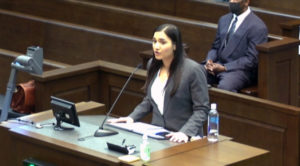Appellate Litigation Clinic makes history before Georgia Court of Appeals
Throughout the 2021–22 academic year, Appellate Litigation Clinic students appeared before six appellate courts and made history arguing before the Georgia Court of Appeals. Led by Director Thomas V. Burch, current students and recent graduates received several victories in their cases. Among them:

Third-year student Roya Naghepour made history as the first law student to present oral argument before the Georgia Court of Appeals.
Third-year student Roya Naghepour was the first student to present oral argument before the Georgia Court of Appeals when she represented a client suing his county commission in Williams v. DeKalb County. Third-year student Dylan L. Mauldin co-wrote the briefs and helped Naghepour prepare for the argument.
Students won a remand in the case Thomas v. Secretary, Fla. Dep’t of Corrs before the U.S. Court of Appeals for the 11th Circuit. The court remanded for an evidentiary hearing on whether amending the client’s habeas petition would be futile. Third-year student Matthew Moore argued the case and 2021 graduates Jared R. Allen and Olivia B. Hunter helped write the briefs. Third-year student Madison G. Mischik helped Moore with oral preparations.
The clinic won a remand in Smith v. Dewberry, a 1983 case where its client was stabbed two hours after warning prison officials that his eventual attacker had threatened him with a knife. The case was argued before the U.S. Court of Appeals for the Eleventh Circuit by third-year student Tinsley J. Stokes and third-year student Mark L. Bailey helped her prepare for the argument.
Successfully arguing for the release of its client, the clinic won the case Arellano Hererra v. Barr before the Board of Immigration Appeals. This finding was the subject of an appeal last year before the U.S. Court of Appeals for the Ninth Circuit, in which the clinic won a remand to the BIA. Former students involved in obtaining the client’s release were 2021 graduates Jason N. Sigalos and Mollie M. Fiero and 2020 graduate John Lex Kenerly IV. Alumnus Benjamin J. Osorio (J.D.’11) advised the clinic on release procedures after relief was granted. The client is now at home and reunited with her seven children.
The Georgia Supreme Court ruled in the clinic’s favor in Ricky J. Johnson v. The State. In the case, Johnson had been convicted of multiple theft-by-taking counts for stealing trucks and other property from a construction company, and he was sentenced separately for each count. The court ultimately vacated a lower court’s order after finding that its merger analysis was flawed. Third-year students Courtney Hogan and Kirstiana Perryman wrote the briefs.
Wilbanks CEASE Clinic wins Criminal Justice Coordinating Council award
The Wilbanks Child Endangerment and Sexual Exploitation Clinic – the first of its kind in the nation – was presented the 2022 Georgia Crime Victim Service Collaboration and Innovation Award from the Criminal Justice Coordinating Council. The honor recognizes “those whose work has been particularly noteworthy and who exemplify the long-term commitment that characterizes many victim service providers, some of whom are also victims of crime.”
School of Law clinics team up to keep immigrant family together
With the help of two School of Law clinics and seven-plus years of advocacy, an immigrant grandmother has gained lawful presence in the United States.
The family said they are “forever grateful” for everything the staff of the Jane W. Wilson Family Justice Clinic and the Community Health Law Partnership Clinic have done. “They communicate, they reach out, they look for answers,” the grandmother said. “They have a wonderful staff that guides you every step of the way and, with laws that change, they make sure they offer the best choice for you and your scenario. … They never fail to help you with breaking down every line and small fine print to make sure you get the ultimate goal.”
The longtime client initially worked with the Wilson Family Justice Clinic, which helped her urgently adopt her grandson, an orphaned U.S. citizen child. Once reaching adulthood, the adoptee enlisted in the U.S. Army Reserves, at which point the Community HeLP Clinic was able to assist the grandmother in obtaining Military Parole in Place, a discretionary measure that allows close family members of active-duty members in the U.S. armed forces to obtain deferred action and work authorization, which will eventually facilitate the client’s family-based pathway to lawful permanent status.
“[The Wilson Family Justice Clinic gave] me hope and some relief after losing my daughter,” the grandmother said. “Being able to raise my grandson with love and dedication has been a top priority.”
As a reservist and participant in the ROTC program at Kennesaw State University, the grandson is planning on a career as an engineering officer in the U.S. Army. He said he takes great comfort in knowing his grandmother has status now. “[It] means she is one step closer to citizenship, and we won’t have to worry about any future issues in government policies about immigration.”
The Wilson Family Justice Clinic’s advocacy was undertaken by Elizabeth N. Rawlings (J.D.’18) and Clinical Associate Professor Christine M. Scartz. Community HeLP Clinic Staff Attorney Kristen Shepherd handled the Parole in Place application, while earlier work on the client’s immigration case involved Mary S. Honeychurch (J.D.’18) and Pedro Dorado (J.D.’17), supervised by Associate Dean Jason A. Cade. Administrative Associate Sarah Ehlers provided key support to both clinics.
